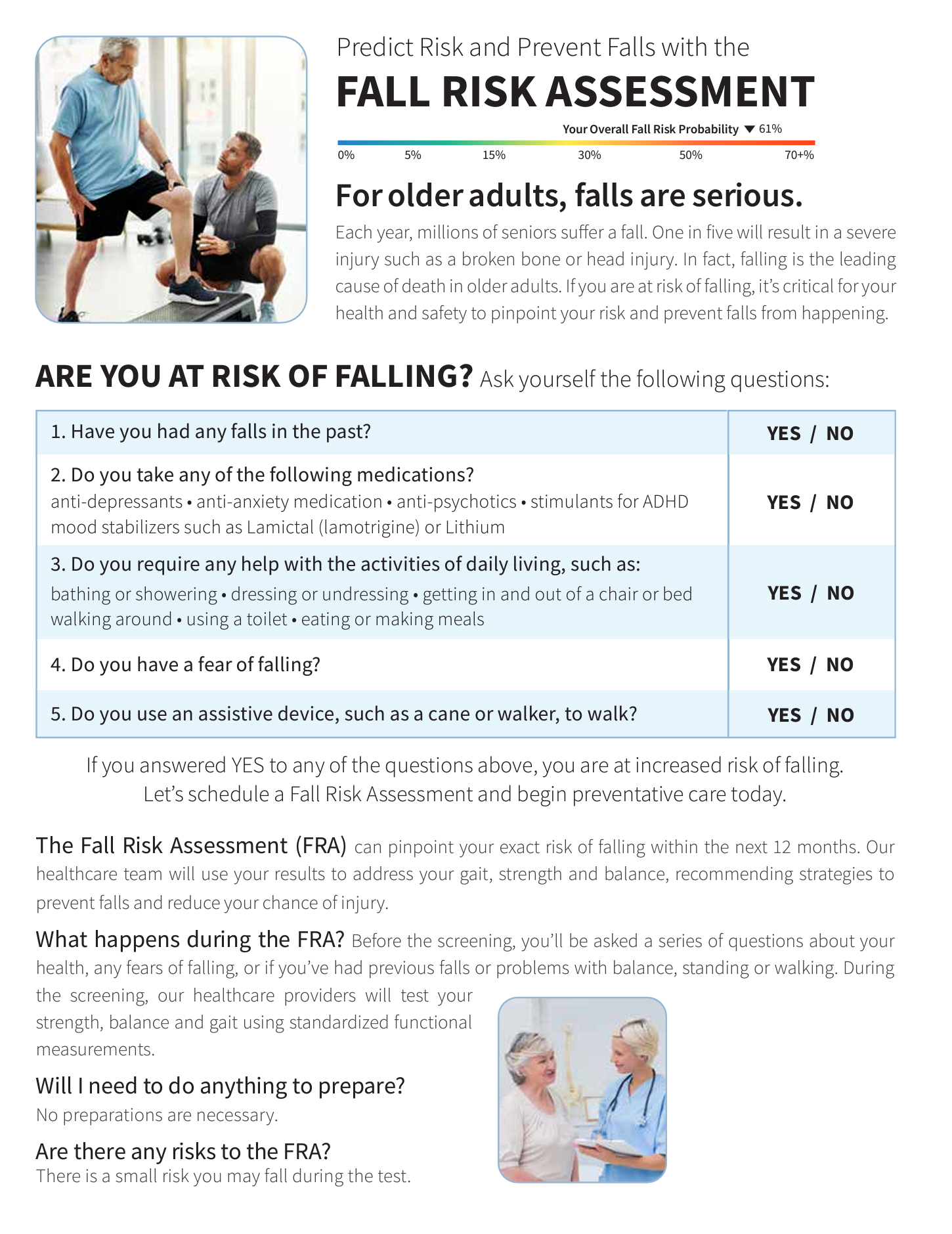The Definitive Guide for Dementia Fall Risk
The Definitive Guide for Dementia Fall Risk
Blog Article
Dementia Fall Risk - Truths
Table of ContentsSome Ideas on Dementia Fall Risk You Need To KnowThe Dementia Fall Risk IdeasDementia Fall Risk Can Be Fun For AnyoneThe Single Strategy To Use For Dementia Fall Risk
A loss risk evaluation checks to see just how most likely it is that you will certainly fall. The assessment normally includes: This includes a collection of concerns regarding your general health and if you've had previous drops or troubles with equilibrium, standing, and/or strolling.Treatments are recommendations that might minimize your danger of dropping. STEADI includes 3 actions: you for your risk of falling for your threat elements that can be improved to attempt to prevent falls (for instance, equilibrium issues, impaired vision) to reduce your danger of dropping by making use of effective strategies (for instance, giving education and learning and resources), you may be asked a number of inquiries consisting of: Have you dropped in the past year? Are you stressed concerning falling?
If it takes you 12 secs or even more, it may imply you are at greater risk for a fall. This examination checks stamina and equilibrium.
Move one foot midway ahead, so the instep is touching the large toe of your various other foot. Move one foot completely in front of the other, so the toes are touching the heel of your various other foot.
The smart Trick of Dementia Fall Risk That Nobody is Talking About
The majority of falls take place as a result of numerous contributing aspects; as a result, managing the risk of dropping starts with identifying the factors that add to drop danger - Dementia Fall Risk. A few of one of the most relevant risk aspects consist of: History of previous fallsChronic clinical conditionsAcute illnessImpaired stride and equilibrium, lower extremity weaknessCognitive impairmentChanges in visionCertain high-risk medicines and polypharmacyEnvironmental elements can likewise raise the risk for falls, consisting of: Insufficient lightingUneven or damaged flooringWet or unsafe floorsMissing or damaged handrails and order barsDamaged or improperly equipped equipment, such as beds, wheelchairs, or walkersImproper use assistive devicesInadequate supervision of individuals staying in the NF, including those that show hostile behaviorsA effective loss risk management program calls for a comprehensive scientific evaluation, with input from all participants of the interdisciplinary team

The you can try these out treatment plan ought to likewise consist of treatments that are system-based, such as those that advertise a risk-free setting (ideal lights, handrails, get hold of bars, and so on). The effectiveness of the interventions must be assessed regularly, and the treatment plan modified as essential to mirror adjustments in the autumn risk evaluation. Carrying out a loss risk administration system making use of evidence-based best technique can minimize the frequency of falls in the NF, while limiting the possibility for fall-related injuries.
The Best Guide To Dementia Fall Risk
The AGS/BGS guideline suggests evaluating all grownups matured 65 years and older for loss threat each year. This screening contains asking individuals whether they have actually dropped 2 or more times in the past year or sought clinical focus for a loss, or, if they have actually not dropped, whether they really feel unstable when walking.
Individuals that have fallen when without injury should have their equilibrium and gait reviewed; those with stride or equilibrium irregularities ought to obtain extra analysis. A history of 1 loss without injury and without gait or equilibrium troubles does not warrant more analysis past ongoing annual fall danger screening. Dementia Fall Risk. An autumn threat analysis is called for as component of the Welcome to Medicare assessment

The 25-Second Trick For Dementia Fall Risk
Documenting a falls history is one of the top quality indicators for fall avoidance and monitoring. Psychoactive drugs in certain are independent predictors of falls.
Postural hypotension visit homepage can frequently be eased by decreasing the dose of blood pressurelowering medications and/or quiting medications that have orthostatic hypotension as a side effect. Use of above-the-knee support tube and resting with the head of the bed raised may additionally lower postural decreases in blood pressure. The recommended elements of a fall-focused physical exam are displayed in Box 1.

A Pull time higher than or equal to 12 secs suggests high autumn threat. Being unable to stand up from a chair of knee height without making use of one's arms suggests increased fall threat.
Report this page